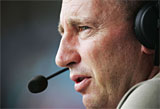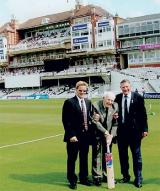On the air, in the air
|
|

|
Cricket journalists are occasionally accused of a lack of perspective, but Jonathan Agnew, the BBC's cricket correspondent, has come up with one way of achieving the definitive overview. He has moved from the airwaves to the air. Agnew, 47 this year, decided to become a pilot during a "drunken evening" with his wife and friends last summer, and got his licence two days before heading off to Australia to report on the Ashes.
"It's something I've always wanted to do," he says. "I did have a go at it about 20 years ago but only very briefly. Now I love it. Other people play golf on tour. I take an aeroplane up."
It takes a minimum 50 hours' flying time to qualify, and Agnew says it's a lot of hard work. "But the big moment is when they let you go off and do a circuit of the airfield yourself. And then the landing, wow! It's a terrible but amazing feeling."
By the middle of the Ashes series, Agnew had graduated to the four-seat Cessna 172, and his ambition is to "do a Palin" and cover the 2010-11 Ashes series in Australia by plane. "I really want to get a film crew together, and drop into weird and wonderful bush strips and farms." (He could also take David Gower and John Morris up for a spin to mark the 20th anniversary of their infamous Tiger Moth flight over England's game in Queensland.) So what is it about flying? "I once did Nottingham-Leicester-Nottingham on a beautiful summer's evening," he says. "I was there by myself. I went past a hot-air balloon, I saw my house in the distance. I saw the rolling fields of Leicestershire. I got back and told my wife it was better than sex. She wasn't thrilled."
|
|

|
An occasional game of cricket
The last time Henry Allingham popped in at The Oval for a spot of cricket, W. G. Grace was playing. When he returned on May 5, 2006 for the Championship match between Surrey and Gloucestershire, it was a month and a day before his 110th birthday, which made him Britain's oldest man - not to mention the sole survivor of the Battle of Jutland in 1916.Unsurprisingly, there was some dispute over the precise gap between these two visits to The Oval: some put it at 100 years exactly and others felt the date was 1903, when W.G. turned out for London County against Surrey.
Mr Allingham, not being what you might call a regular cricket fan, was a little hazy himself - but only about the details. "I saw W. G. Grace bat," he said firmly on a day when he had lunch with the Surrey committee, met members of the team and went for a leisurely stroll around the boundary. "You could always tell who he was by his long beard. He scored quite a lot that day but I can't remember how many."
Young man in the middle
Sri Lanka's draw with the British Universities at Fenner's in April 2006 was an unremarkable affair - except that six members of the Sri Lankan team were actually older than one of the umpires. At 26 years and 127 days, Michael Gough was believed to be the youngest official to stand in an English first-class match. "I was very nervous," he says. "But I'd have been stupid not to be."Gough was thought likely to be an England player by now. But he fell out of love with playing very rapidly. After a brief career (which included the captaincy of the England Under-19 team and, in 2002, a batting average for Durham of over 50) he called it a day, aged 23. "Each year I kept thinking: 'I'll give myself another season and I might enjoy myself more.' But it didn't happen. There would be times when I'd sit there thinking: 'Surely there's more to life than this.' I still enjoyed watching the game, though, so I thought that I might be able to give it a go as an umpire."
In between working for his father's business, selling sports kit and trophies in Hartlepool, he sat his umpiring exams and applied for the ECB reserve list. He was accepted immediately, and is now keen to break through to the full first-class rota. "Getting as much experience as possible is the key," he says. "That, and earning the respect of the players."
|
|

|
Life after Lord's - 1
Tim Lamb's resignation as chief executive of the ECB in 2004 brought to an end 31 years of direct involvement with cricket, first as a seam bowler for Middlesex and Northamptonshire, then as an administrator. But at 51, he was too young to retire, and he is now chief executive of the Central Council of Physical Recreation, an umbrella organisation for the 260 or so sports and recreational activities in the UK, including the ECB. "We represent everything from football to folk-dancing, from bowls to bridge," says Lamb, who is working to promote the CCPR as "the definitive independent voice of public sport and recreation".The CCPR was founded in 1935, essentially as a palliative to the Great Depression. While other European nations used physical education as an adjunct to dubious ideologies, the council aimed, in the words of its founder, Phyllis Colson, to enable youngsters "to take part in enjoyable and health-giving physical activity". Lately, it had been considered a bit old-fashioned and irrelevant. But the 2012 London Olympics, and attendant controversies, may change that.
"We feel that there has been no proper leadership or strategic direction shown in maximising the legacy of the London Olympics," Lamb says. "We are also alarmed at the prospect of yet more money being raided from the National Lottery to help pay for the Olympics, which would impact on sport at a community level."
Lamb says he misses the people in cricket, but not such crises as Zimbabwe. He is proud of what he achieved at the ECB and is revelling in what is perhaps a quieter, if equally politicised, challenge: "The workings and intricacies of Whitehall and Westminster take some getting used to. But sport has never been higher up the political agenda. And I really am enjoying it."
Life after Lord's - 2
Sportswriters often talk casually about the end of an era but, in the case of Stephanie Lawrence, who retired last year from MCC, it was a cliché that felt genuine rather than gushing. Lawrence arrived in 1967 as an extra pair of hands for the secretary Billy Griffith, then served as PA to his three successors - a job which for many years included administering the ICC in her spare moments. And the Lord's hospitality arrangements.She knew little about cricket when she arrived, but she lasted 39 years, with a brief gap in the late 1970s, which coincided with the upheaval caused by Kerry Packer and World Series Cricket. She went to court to follow the Packer proceedings anyway.
"MCC was a way of life," she says. "I suppose I was quite bossy and organised. I used to get things done. I think it probably helped to be a woman in those circumstances: the odd flirt and nice word never did any harm."
The ICC was a little harder: "Some ICC members were a little askance that here was a female trying to give orders. But women employees have always been accepted at MCC. It's never been a them-and-us situation. And I've always thought the fun poked at the club - red and yellow ties, moustachioed old colonels boozing away, that sort of thing - was a little unfair."
She now spends days at an even more ancient monument, leading guided tours of the Roman museum in Alcester, near her Warwickshire home, but she intends to use the honorary membership conferred on her retirement. "I hope MCC doesn't become too function-led. I realise money has to be raised, but it's a club first and foremost."
One year the Ashes - the next, Crook Town
When Gary Pratt ran out Ricky Ponting at Trent Bridge in 2005, then joined in the open-top bus trip through London, the world - however fleetingly - seemed his oyster. A year later, Pratt, just 24, was released by Durham. No other county rushed to sign him.Moping was one option. Tapping into past talents was another, so Pratt, who had been with Sheffield Wednesday as a teenager before opting for cricket, got in touch with Crook Town, a middling team in the Northern League second division. After an October training session, he was told to bring his boots to face Brandon United. He played centre-forward, and spent the next two days in bed.
Crook Town's golden spell came during a ten-year spell in the 1950s and 1960s when they won the FA Amateur Cup four times. The trophy cabinet is emptier these days, but the football is still tough. "That first game was a lot harder physically than I thought it would be," said Pratt. "In general the standard's pretty good, although the pitches aren't great: there are a lot of muddy quagmires about. It's kick and run - not like watching Chelsea."
Pratt has had struggles of his own. After slotting straight into the centre forward's role, he managed only two goals before being shunted back into the midfield, and from there - following a change of manager - on to the subs' bench, his familiar milieu. But he was enjoying the banter and the exercise, even if he missed his cricket.
"I just want the chance to play cricket again," he said. "It's a great life. I'll be really downhearted and disappointed if I don't get to go anywhere after just one club. Not even the best players stay at just one club."
Commentator extraordinary
Not much good news comes out of Zimbabwe these days, so it was uplifting to hear the story of Dean du Plessis, a 28-year-old blind man who is making a name for himself as a cricket comments man on TV and radio. He started out doing mock commentaries at school and can tell the bowlers apart by the sound of their run-ups: "The way Dwayne Bravo drags his feet, you can make him out, and Shane Warne sounds like he is constipated."Batting gets similar treatment: "When a batsman hits through the off side, the ball makes a sharp cracking sound. When he plays to leg, it's a bit muffled because he is playing off his pads. I can tell when a bowler bowls a yorker from the way the batsman jams down."
Neil Manthorp, the South African commentator, recalls: "Once, in a momentary lapse of concentration, I started an over with 'And here comes Agarkar again, from the Pavilion End...' Dean waited for the ball to go dead before quietly saying, 'Are you sure that's Agarkar, Neil?' Indeed, there had been a bowling change and it was Ganguly trundling in. Dean could tell the difference from the sound effects from the stump mike."

